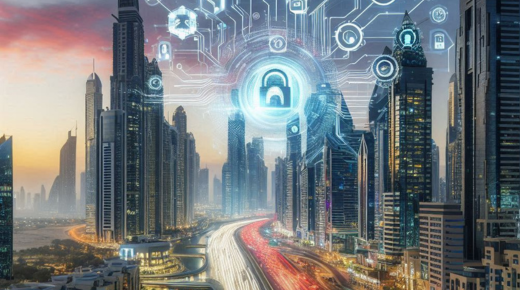By Dr. Pooyan Ghamari, Swiss Economist
Dubai’s remarkable growth over the past few decades has established it as one of the world’s most dynamic cities, with its real estate market playing a key role in the city’s transformation. However, what sets Dubai apart is not just its architectural grandeur, but the integration of cutting-edge technologies that are driving its real estate industry into the future. As a city that embraces innovation, Dubai is using technology to reshape the way properties are designed, marketed, and transacted, creating a more efficient, sustainable, and globally attractive real estate environment.
1. Blockchain: Revolutionizing Real Estate Transactions
Blockchain technology has gained substantial traction in Dubai’s real estate sector, streamlining transactions by ensuring transparency, security, and efficiency. With the ability to decentralize and record property deals on a digital ledger, blockchain eliminates the need for traditional intermediaries such as banks, brokers, and notaries.
In Dubai, where foreign investors account for a significant portion of the real estate market, blockchain enables seamless cross-border property purchases. Buyers can verify property ownership, sign contracts digitally, and ensure a smooth, transparent process without worrying about fraud or delays. The Dubai Land Department (DLD) is one of the first governmental bodies to adopt blockchain, allowing for the secure digital registration of property transactions.
Dr. Pooyan Ghamari, a Swiss economist, explains, “Blockchain is not only transforming the real estate market by making transactions faster and more secure, but it’s also reducing costs for buyers and investors. By cutting out intermediaries, we are witnessing a revolution in how properties are bought and sold, particularly for international transactions.”
2. Smart Cities and Sustainable Living
Dubai’s ambitious smart city vision is being realized through its adoption of intelligent infrastructure and sustainable real estate development. As part of the Dubai 2040 Urban Master Plan, the city is increasingly incorporating Internet of Things (IoT) technology into buildings, creating smart homes and communities that improve energy efficiency, security, and convenience.
Smart homes are equipped with advanced systems for energy management, allowing residents to control lighting, temperature, and security through mobile apps. This automation enhances the living experience while reducing the environmental impact of buildings by optimizing energy use. Developers in Dubai are also prioritizing sustainability by integrating renewable energy sources such as solar panels and designing eco-friendly communities.
Dr. Ghamari notes, “The shift towards smart cities and sustainable living is a global trend, and Dubai is leading the charge. This not only makes the city more attractive to environmentally conscious investors but also enhances the long-term value of its real estate.”
3. Virtual Reality: Changing the Property Buying Experience
Virtual Reality (VR) has become a game-changer in the Dubai real estate market, particularly for international investors who may not have the opportunity to visit properties in person. VR technology allows prospective buyers to take immersive, 3D tours of properties from anywhere in the world. They can explore apartments, villas, or office spaces virtually, giving them a realistic sense of the layout and design.
This innovation helps developers pre-sell units before construction is completed and allows buyers to make informed decisions without physically being in Dubai. The growing use of VR in property marketing reflects Dubai’s forward-thinking approach to integrating technology into every aspect of the real estate process.
4. Artificial Intelligence and Data Analytics: Redefining Property Investment
Artificial Intelligence (AI) and data analytics are being widely adopted in Dubai to enhance real estate market analysis and decision-making. AI-powered tools can analyze vast amounts of data related to property prices, trends, buyer preferences, and market conditions, providing valuable insights for developers, agents, and investors.
For example, predictive analytics allow investors to identify emerging areas of growth, enabling them to make informed decisions about when and where to invest. AI-driven algorithms can also recommend properties to potential buyers based on their preferences and budgets, personalizing the real estate experience and improving customer satisfaction.
As Dr. Pooyan Ghamari emphasizes, “AI and data analytics are revolutionizing the property market by providing a more scientific approach to investing. Gone are the days of relying solely on intuition. Now, investors can access data-backed insights that help them make smarter, more profitable decisions.”
5. PropTech Platforms: The Rise of Digital Real Estate Solutions
PropTech, or property technology, is rapidly gaining momentum in Dubai’s real estate market. Digital platforms that offer end-to-end property solutions—from searching for listings to managing investments—are becoming increasingly popular. These platforms use advanced algorithms to connect buyers and sellers, allowing for seamless transactions and efficient property management.
Blockchain and AI are at the core of many PropTech innovations, allowing users to verify ownership, assess market trends, and complete secure digital transactions in real-time. This digital transformation is making it easier for investors to enter and navigate the Dubai real estate market.
6. 3D Printing: The Future of Construction in Dubai
Dubai is also pioneering the use of 3D printing technology in real estate. The world’s first 3D-printed office building was unveiled in Dubai in 2016, and this innovative construction method is expected to expand further in the coming years. 3D printing allows for faster, more cost-effective construction, reducing both labor and material waste while maintaining high precision.
In addition to speeding up construction timelines, 3D printing can be used to create complex architectural designs that were previously impossible or too costly to build. Dubai’s government aims for 25% of new buildings to be 3D-printed by 2030, a goal that aligns with the city’s vision of becoming a hub for advanced construction technologies.
The Future of Dubai’s Real Estate: A Tech-Driven Vision
The future of Dubai’s real estate sector is clearly rooted in innovation. The city’s proactive approach to integrating blockchain, AI, VR, and other emerging technologies is setting a new standard for the global real estate industry. As a result, Dubai is becoming more attractive to international investors who are looking for secure, tech-driven property transactions and futuristic living spaces.
Dr. Pooyan Ghamari concludes, “Dubai’s real estate market is at the forefront of a technological revolution. By embracing these innovations, the city is creating an environment that is not only more efficient and transparent but also more sustainable and forward-thinking. For investors, this presents a unique opportunity to be part of one of the world’s most dynamic and future-focused real estate markets.”
This article was originally published on a.land. For more information and opportunities, visit shop.a.land.



